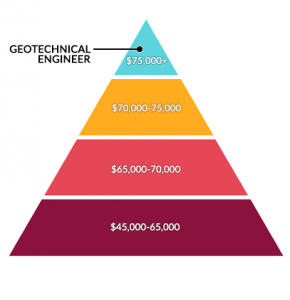Not known Facts About Geotheta
Not known Facts About Geotheta
Blog Article
Geotheta Can Be Fun For Everyone
Table of ContentsGeotheta Can Be Fun For AnyoneThe 9-Second Trick For GeothetaGeotheta for BeginnersGeotheta for BeginnersNot known Factual Statements About Geotheta

They carry out website examinations, collect samples, execute laboratory examinations, and assess data to assess the viability of the ground for building jobs - Geo Tech Engineer. Based upon their searchings for, geotechnical engineers offer suggestions for structure style, incline security, retaining structures, and mitigation of geotechnical risks. They work together with various other experts, such as engineers, architectural designers, and building and construction groups, to make certain that geotechnical factors to consider are incorporated right into the total task layout and execution
By assessing the behavior and residential or commercial properties of soil and rock, they can determine prospective geotechnical hazards such as landslides, soil negotiation, or incline instability. Their expertise aids protect against failings or crashes that might threaten lives and residential property. Right here are some comprehensive responsibilities and responsibilities of a geotechnical designer: Website Investigation: Geotechnical engineers conduct website examinations to collect data on subsurface conditions.
They translate the information to recognize the properties and habits of the dirt and rock, including their stamina, leaks in the structure, compaction features, and groundwater problems. Geotechnical Evaluation and Style: Geotechnical designers assess the information accumulated throughout site investigations to examine the stability and suitability of the site for construction tasks. They execute geotechnical estimations and modeling to examine aspects such as bearing capacity, settlement, incline security, lateral earth pressures, and groundwater flow.
Some Known Questions About Geotheta.
Structure Style: Geotechnical engineers play a critical function in developing structures that can safely support the desired structure. They assess the dirt conditions and lots demands to determine the ideal foundation kind, such as shallow structures (e.g., footings), deep structures (e.g (https://www.twitch.tv/geotheta/about)., heaps), or specialized strategies like dirt enhancement. They think about elements such as settlement restrictions, birthing capacity, and soil-structure communication to create optimal structure styles
They evaluate construction strategies, display site tasks, and carry out field inspections to validate that the style recommendations are followed. If unpredicted geotechnical problems occur, they assess the scenario and supply recommendations for removal or modifications to the design. Threat Evaluation and Mitigation: Geotechnical engineers assess geotechnical threats and risks connected with the job site, such as landslides, liquefaction, or dirt erosion.

Partnership and Interaction: Geotechnical designers function very closely with various other experts involved in a task, such as designers, architectural engineers, and construction groups. Efficient communication and partnership are necessary to integrate geotechnical factors to consider into the total job design and building and construction process. Geotechnical designers offer technological experience, response questions, and guarantee that geotechnical needs are satisfied.
An Unbiased View of Geotheta
Here are some sorts of geotechnical designers: Structure Designer: Foundation engineers specialize in developing and examining structures for structures. They evaluate the soil problems, lots needs, and website qualities to figure out one of the most appropriate foundation type and design, such as shallow foundations, deep foundations, or specialized methods like stack structures.
They examine the elements affecting incline security, such as dirt residential or commercial properties, groundwater conditions, and incline geometry, and develop approaches to avoid slope failures and minimize dangers. Earthquake Engineer: Earthquake designers concentrate on examining and creating frameworks to stand up to seismic pressures. They evaluate the seismic threat of a website, examine dirt liquefaction possibility, and establish seismic style criteria to ensure the safety and durability of frameworks throughout earthquakes.
They carry out field testing, accumulate examples, and evaluate the collected information to identify the dirt residential properties, geologic formations, and groundwater conditions at a site. Geotechnical Instrumentation Designer: Geotechnical instrumentation designers focus on monitoring and determining the habits of soil, rock, and frameworks. They install and keep instrumentation systems that keep an eye on variables such as soil settlement, groundwater levels, incline motions, and structural variations to evaluate efficiency and supply early cautions of potential problems.
Geotheta Fundamentals Explained
They perform tests such as triaxial examinations, consolidation examinations, straight shear tests, and permeability examinations to collect data for geotechnical evaluation and layout. Geosynthetics Designer: Geosynthetics engineers concentrate on the layout and application of geosynthetic materials, such as geotextiles, geogrids, and geomembranes. They utilize these products to improve soil security, reinforce slopes, give drainage services, and control erosion.
They tend to be investigative individuals, which suggests they're intellectual, reflective, and analytical. They wonder, methodical, sensible, analytical, and logical. A few of them are additionally social, meaning they're kind, generous, cooperative, patient, caring, valuable, understanding, sensible, and pleasant. Does this audio like you? Take our free profession examination to discover if geotechnical designer is just one of your leading career matches.
In the workplace atmosphere, geotechnical engineers utilize specialized software application tools to perform calculations, develop styles, and evaluate data. They prepare records, testimonial job specs, communicate with customers and staff member, and coordinate project tasks. The workplace setting provides a favorable environment for study, evaluation, and partnership with other specialists entailed in the job.
An Unbiased View of Geotheta
They often check out task websites to conduct site examinations, evaluate geotechnical problems, and gather information for analysis. These brows through entail taking a trip to different areas, in check some cases in remote or challenging terrains. Geotechnical engineers may execute dirt sampling, conduct examinations, and monitor building and construction activities to make sure that the geotechnical facets of the project are being applied appropriately.
Geotechnical engineers likewise work in specialized geotechnical labs. Geotechnical research laboratory engineers work extensively in these environments, managing screening devices, operating instruments, and taping information.
Report this page